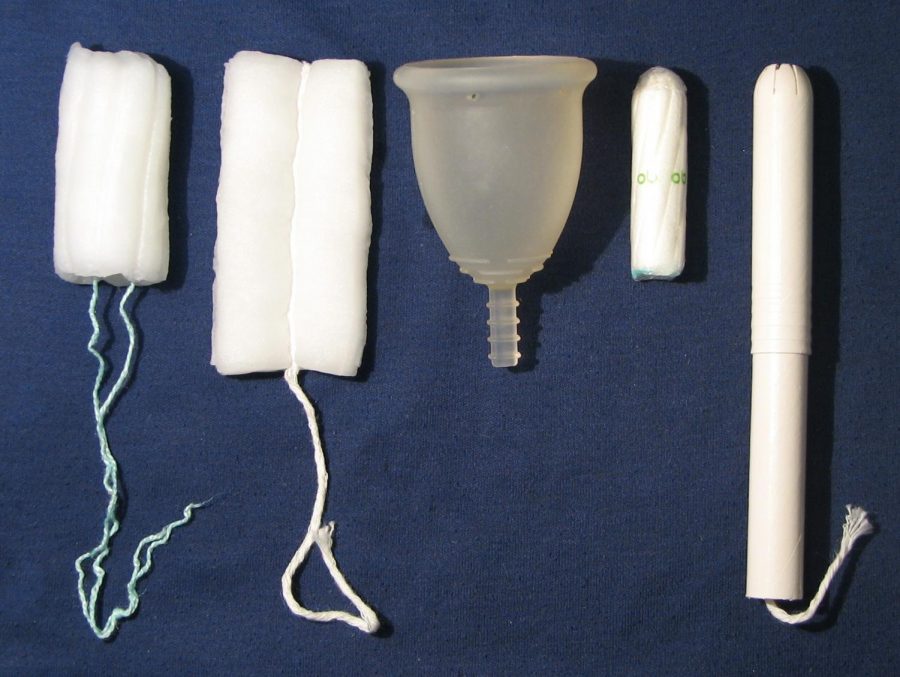Your donation will support the student journalists of The Tide, Richard Montgomery High School's student newspaper. Your contribution will allow us to purchase equipment and cover our annual website hosting costs.
RM’s Girl Up plans to launch menstrual equity campaign
April 13, 2020
Photo used with permission under a Creative Commons License
RM students are working hard to ensure that menstrual health products will be available in school bathrooms.
The RM SGA has recently partnered with the Girl Up organization to launch the school’s first ever menstrual equity drive. The planned menstrual campaign is three pronged, consisting of a menstrual products drive, a circulating student petition that would be sent to the Maryland State House in support of House Bill 208 and a letter writing station where students can write to their delegate or senator in the State House to advocate for House Bill 208. The campaign was originally scheduled to take place from March 16 – March 20, though it has been postponed indefinitely due to the ongoing corona break.
Originally created by the United Nations, Girl Up is a global organization that works to eliminate the opportunity and achievement gap between genders. At their first February meeting, Girl Up members decided to launch a project targeting menstrual equity. “[The project] seeks to provide an opportunity for students to voice their support for menstrual equity and to create a positive opportunity for small-scale menstrual equity at RM,” sophomore Uma Fox said. With the help of schoolwide president Claire Gelillo, the SGA became a contributing partner to the campaign.
Within the next few weeks, the project team was assembled, (consisting of Sabrena Carver, Uma Fox, Claire Gelillo, Rachel Lacoretz, Hana O’Looney, Lucy Meyer, Isabelle Scholes-Young and Ita Teta,) and the project proposal was sent to administration. The menstrual equity campaign is advocating for equal access to menstrual hygiene products by ensuring the accessibility of these products for girls in all schools. “The menstrual product drive was to make a statement that [menstrual equity] is so important and essential, that if our state government wouldn’t do so, we [would] step up and take matters into our own hands,” junior Rediet Ghebrehiwet said.
Over the course of the drive, SGA members plan to collect pads and tampons on Main Street during lunch. The week following the campaign, all donated products will be allocated in school bathrooms for use by all girls. There will be a product basket in at least one bathroom per floor.
Students are welcome to replenish the supply if they have extra products as well. “We understand that relying on student donations is not a sustainable model, nor should we have to do this on our own,” junior Claire Gelillo said. “That is why we will also have a petition circulating the school for students to sign imploring the Maryland state legislature to pass a bill requiring free menstrual products in at least two bathrooms per Maryland public school.”
The petition will be in favor of Maryland House Bill 208, a bill advocating for the availability of free menstrual products in all Maryland school bathrooms. “Each county board of education [will] ensure that each public school provide[s], at no charge to students, menstrual hygiene products via dispensers in the restrooms at the school,” the bill writes. The campaign is additionally planning to host letter writing on Main Street to further support the passing of House Bill 208.
“Unfortunately, the bill that would have provided free menstrual products in schools died in the house this year. However, students should call or write to their state delegates and senate offices to voice their support for freed menstrual hygiene products in schools… to advocate for its re-creation next year,” Fox said. Students will have the opportunity to do so on Main Street during the equity campaign.
A number of student advocates believe that the inaccessibility of menstrual products is a detrimental problem in the modern world. “Menstrual equity is long overdue. It’s crazy that I even have to say it, but menstruation is a bodily function like any other. We don’t need to bring our own toilet paper to school. It should be the same with pads and tampons,” Gelillo said.
“We’ve all been in the position where we did not have a pad or tampon and had to miss class time to find those products. [Sometimes we] are left with no choice but to use the ones in the nurse’s office, which means missing 10+ minutes of class time. That’s not okay or fair,” Ghebrehiwet said.
Proponents of menstrual equity also believe that the topic should be more widely discussed. “Around the world, people who menstruate continue to face the inaccessibility of menstrual hygiene products. This reality results in vast educational, career, and medical losses, all due to the unequal treatment of menstrual hygiene products as a luxury. [Thus,] it is necessary for people to advocate for accessible, affordable menstrual hygiene at a global, national, and local level,” Fox said.
“The road here has been confusing, frustrating, but most of all, inspiring. Confusing because this isn’t something we should have to be asking for and addressing in 2020. Frustrating because the Maryland bill has died two years in a row. Inspiring because despite it all, we are coming together to call out an injustice and doing everything in our power to solve it. We need menstrual equity. We can and should demand more,” Gelillo said.
